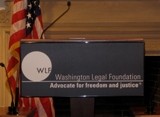 Last month, a Legal Pulse post discussed some important courtroom developments involving disputes over so-called standards-essential patents (“SEPs”). We noted in the post that federal agencies and elected officials were also expressing interest in and concern over SEPs. Since that post there has been a flurry of activity. In just the past week, we have seen:
Last month, a Legal Pulse post discussed some important courtroom developments involving disputes over so-called standards-essential patents (“SEPs”). We noted in the post that federal agencies and elected officials were also expressing interest in and concern over SEPs. Since that post there has been a flurry of activity. In just the past week, we have seen:
- A proposed settlement from the Federal Trade Commission in the context of a merger affecting automobile air conditioning equipment makers where the company being acquired, SPX Services, was a holder of SEPs and had been seeking injunctions against allegedly willing licensees of the patents.
- Ericsson filing a patent infringement and breach of contract lawsuit against Samsung in the Eastern District of Texas where SEPs and alleged failure to offer a license on RAND terms is involved.
- The U.S. International Trade Commission announcing it will review a USITC’s judge’s decision that Apple did not infringe Samsung patents. In the announcement, the Commission seeks public comment on several questions related to SEPs.
At a Washington Legal Foundation Media Briefing program yesterday, Standards-Essential Patents: Where Do IP Protections End and Antitrust Concerns Begin?, two academic experts on patents and antitrust, as well as a leading patent pool and standards practitioner, addressed these developments and the larger question of what role government can and should play in SEP controversies.
Speaker Professor Adam Mossoff referenced research on America’s first “patent war”, involving sewing machines, which led to an Arizona Law Review article. Professor Contreras based his presentation on a research paper available here.
Those attending the program in person also received copies of past WLF publications relevant to the topic being discussed. Links to those papers appear below.
- Standard-Essential Patents: An Increasingly Contentious Issue At The U.S. International Trade Commission by Paul M. Bartkowski and Evan H. Langdon
- Technical Standards Setting Organizations And Competition: A Case For Deference To Markets by Professor Raymond T. Nimmer
- Emerging Risks For U.S. High Tech: How Foreign “Public Interest” Regulation Threatens Property Rights And Innovation by Lawrence A. Kogan
